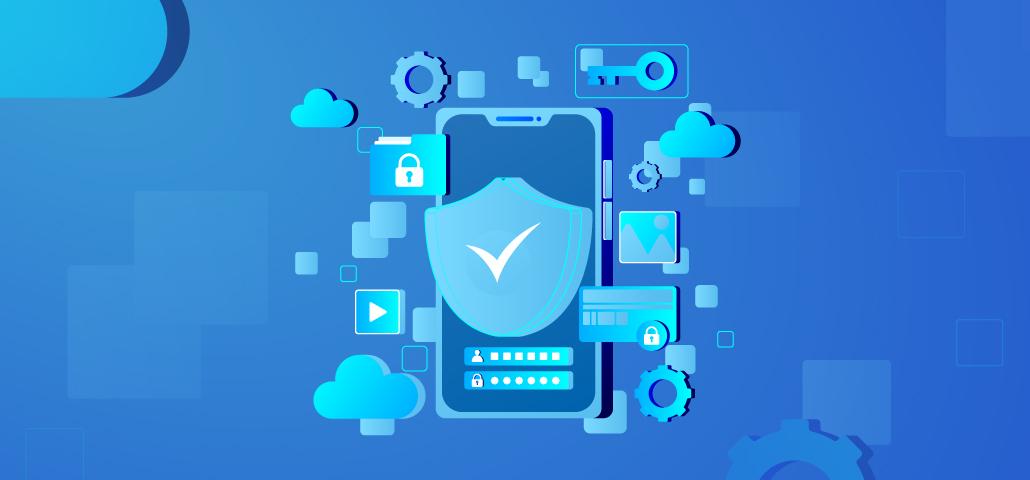Best Practices To Develop Secure Mobile Apps
 Admin
Admin Mobile App Development
Mobile App Development May 02, 2024
May 02, 2024

Table of Content
The mobile app industry is booming with over 6.3 billion smartphone users worldwide. The growth in app usage and smartphone adoption doesn't seem to be slowing down anytime soon.
Add to that the 1.14 billion tablet users globally, a number that has increased by 36% over the past six years. Just take a moment to look around you, and you'll likely see that almost everyone is glued to their mobile devices.
We rely on our phones for everything—from working and eating to commuting and relaxing. Chances are, you are even reading this on a mobile right now. In fact, studies have found that the average human spends over 2 months on their phones.
But no one’s talking about the threats and vulnerabilities your mobile might be holding. Despite the widespread adoption of mobile apps, a critical question often remains unanswered: Are mobile applications genuinely secure? Securing a mobile app ensures that personal information stored in the app remains private and safe from thieves, or in this case, hackers.
Top 8 Best Practices for Developing Secure Mobile App
Data Encryption
To protect data effectively, employing both symmetric and asymmetric encryption methods is essential. Symmetric encryption uses a single key to encrypt and decrypt information, making it faster and suitable for large volumes of data. Asymmetric encryption, although slower, uses two keys (public and private) and adds an extra layer of security, making it ideal for secure communications over the internet. A practical application of this is in e-commerce transactions, where sensitive information like credit card details must be protected.
Secure Coding
Secure coding is vital to prevent vulnerabilities that can be exploited by hackers. This involves guidelines and best practices such as input validation to prevent SQL injection and cross-site scripting (XSS) attacks. A regular schedule of code reviews and vulnerability assessments can help catch issues early. For instance, the infamous Equifax data breach was due to a failure to address a known vulnerability in the Apache Struts web framework, highlighting the importance of timely updates and patches.
User Authentication
Enhancing user authentication processes goes beyond simple passwords. For example, implementing two-factor authentication (2FA) or multi-factor authentication (MFA) can significantly reduce the risk of unauthorized access. This method was effectively used by Google to improve security after recognizing that over 100,000 users were at risk from phishing attacks every year. It requires users to provide two forms of identification, dramatically reducing potential breaches.
Compliance and Integrity
Meeting regulatory compliance and maintaining the integrity of your app is non-negotiable. This involves adhering to standards set by regulatory bodies and app stores, which often require apps to go through rigorous security checks before they are approved for distribution. The use of code signing certificates is a standard practice here; it ensures that any piece of code is certified as secure and original, not altered since its creation.
Secure APIs
APIs facilitate crucial interactions between different software programs but can open security gaps if not properly secured. Implementing measures such as OAuth for token-based authentication helps secure these interactions. For instance, when Twitter’s API was exploited, it led to significant security breaches, underscoring the need for robust API security protocols.
Security Triggers
Implementing automated security triggers can help detect and respond to security threats in real-time. Using cloud services like AWS Lambda allows developers to run code in response to security events, providing immediate action against potential threats, such as unauthorized access attempts or suspicious activities, thus enhancing overall security posture.
Data Privileges
The principle of least privilege must be enforced to ensure that only authorized users have access to sensitive data. This approach minimizes the risk of data breaches by limiting access to information based on user roles. For example, in a hospital’s patient record system, only the doctors and nurses involved in a patient's care should access their personal health information.
Secure Containers
For applications requiring high security, using secure containers to store encryption keys and sensitive data can help isolate and protect these from unauthorized access. Containers can be configured with specific security policies to further enhance their effectiveness, such as using encrypted storage volumes.
By implementing these practices thoughtfully and consistently throughout the entire mobile app development lifecycle, you can significantly enhance your applications’ security and ensure they meet the high expectations of users and regulators alike.
Conclusion
At Prioxis, we prioritize security by adhering to industry-standard best practices for mobile app security and conducting thorough security tests to ensure our applications are reliable and secure. We believe that creating mobile apps involves not just innovation and creativity, but also a commitment to providing a safe user experience. Our expert team of mobile app developers is dedicated to delivering secure and dependable applications through extensive testing practices.
Get in touch

